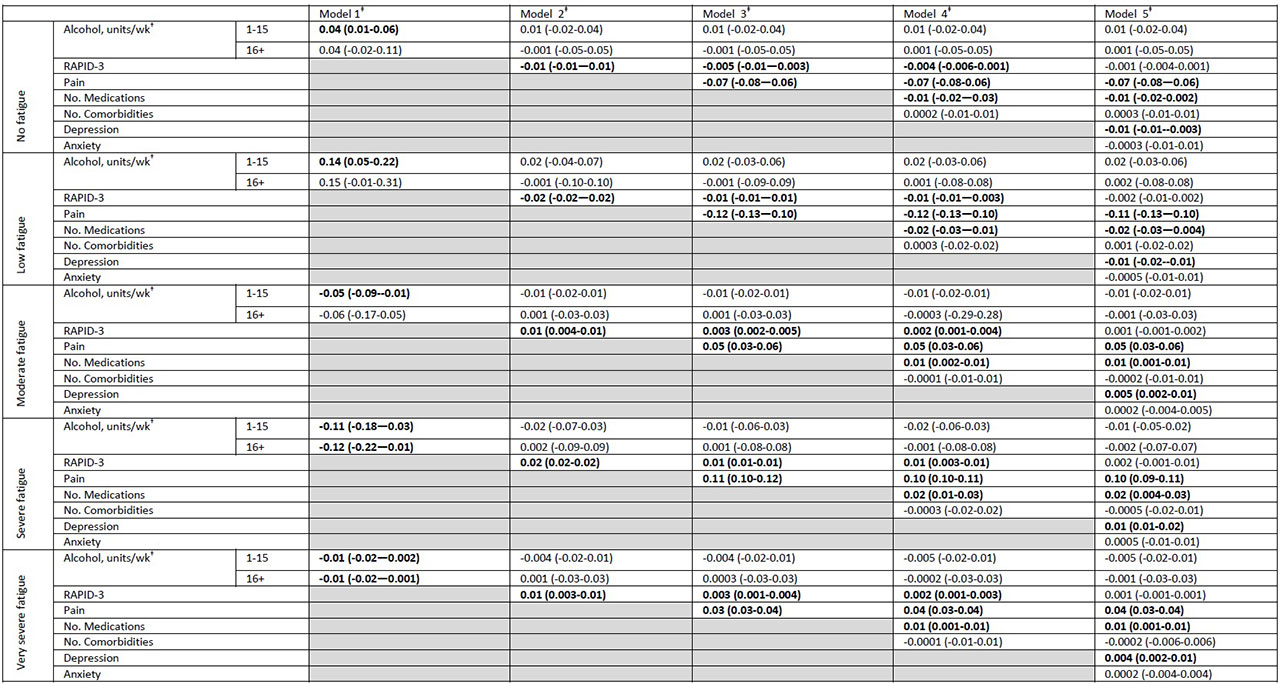Session Information
Date: Tuesday, November 12, 2019
Title: Epidemiology & Public Health Poster III: OA, Gout, & Other Diseases
Session Type: Poster Session (Tuesday)
Session Time: 9:00AM-11:00AM
Background/Purpose: Alcohol consumption is a common, but declining, lifestyle behaviour of UK adults. Previous research has shown that among people with rheumatoid arthritis (RA) moderate drinkers report reduced symptom severity (e.g. pain) compared to non-drinkers, leading some to argue that moderate alcohol consumption may be beneficial for the management of chronic pain conditions. Little is known whether alcohol consumption may also reduce fatigue severity despite fatigue and pain sharing a number of common risk factors and possible mechanisms. This study sought to determine whether alcohol consumption was associated with levels of fatigue severity.
Methods: 270 participants recruited to the QUAlity of life, Sleep and rheumatoid ARthritis study (QUASAR) recorded fatigue and pain severity, measured on an ordinal scale from 1 (none) to 5 (very severe), daily for 30 days using a smartphone app. Average weekly alcohol consumption (in units) was reported at baseline and categorised as none- (0), moderate- (1-15) and heavy-drinkers (16+). Participants also reported an assessment of disease activity (Routine Assessment of Patient Index Data 3; RAPID-3), number of co-morbidities and medications and mental health (Hospital Anxiety and Depression (HAD) scale). Ordinal probit models with random effects tested the independent relationship between alcohol consumption and fatigue severity over time. The model was cumulatively adjusted for disease activity, pain, medications and co-morbidities, and mental health, and marginal effects were calculated. Results are presented as percentage point change in the probability of reporting severe or very severe fatigue and 95% confidence intervals (95%CI).
Results: Of 267 participants who provided alcohol and fatigue data, 107 (40%) were non-drinkers, 139 (52%) were moderate-drinkers and 21 (8%) were heavy-drinkers. Compared to non-drinkers, moderate- and heavy-drinkers were 11 (95%CI:-0.18—0.03) and 12 (-0.22—0.01) percentage points less likely to report severe fatigue, respectively. Both groups were 1 percentage point less likely to report very severe fatigue compared to non-drinkers (-0.02—0.002; -0.02—0.001, respectively). The relationship between alcohol consumption and fatigue severity was attenuated and became non-significant upon adjustment all co-variates. Fatigue severity was predicted by concurrent pain reports, depressive mood and the number of medications, but not RAPID-3 (Table).
Conclusion: In contrast to previous research, we did not find alcohol consumption, at a moderate or heavy level, to be independently associated with fatigue severity over time. It is unlikely that moderate consumption of alcohol will be directly beneficial for those seeking to manage fatigue. Instead, greater benefits may be obtained through the use of management strategies which target pain, medication use, and mood.
To cite this abstract in AMA style:
Druce K, Yimer B, Cordingley L, Lunt M, Kyle S, Dixon W, McBeth J. Alcohol Consumption Is Not an Independent Predictor of Fatigue Severity over Time [abstract]. Arthritis Rheumatol. 2019; 71 (suppl 10). https://acrabstracts.org/abstract/alcohol-consumption-is-not-an-independent-predictor-of-fatigue-severity-over-time/. Accessed .« Back to 2019 ACR/ARP Annual Meeting
ACR Meeting Abstracts - https://acrabstracts.org/abstract/alcohol-consumption-is-not-an-independent-predictor-of-fatigue-severity-over-time/

